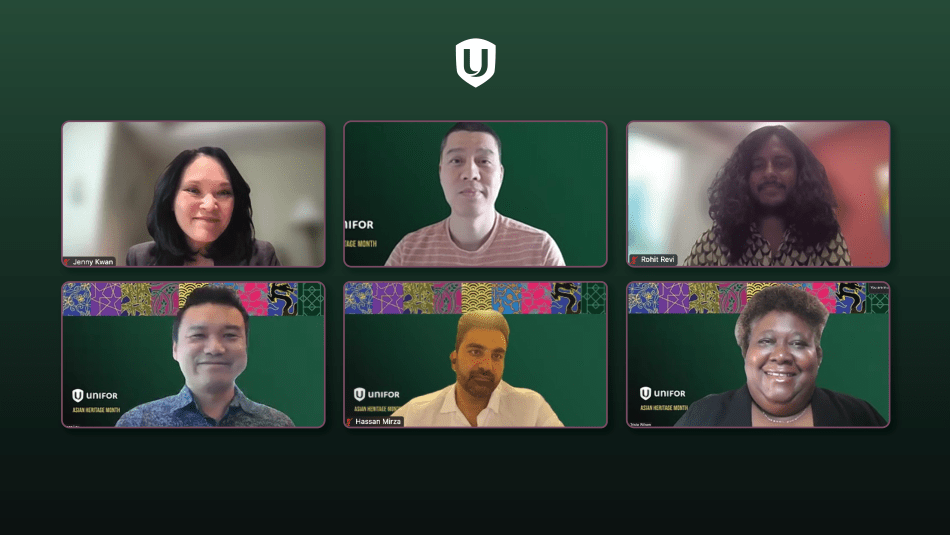
Share
In celebration of Asian Heritage Month, Unifor brought members together for an unforgettable evening of learning, storytelling, and solidarity.
The 2025 theme—Asian Canadian Legacy: We Contribute. We Serve—was brought to life through a webinar, hosted by Unifor organizers Hassan Mirza and Simon Lau, on May 27. The webinar featured a panel discussion to explore the intersection of immigration, labour, and anti-Asian racism.
“Asian Heritage Month is a time to reflect, to celebrate, and to challenge the systems that continue to marginalize workers in our communities. It’s about remembering our roots and imagining a future where every worker is seen, heard, and protected,” said Unifor organizer Hassan Mirza.
Lau emphasized the dual purpose of the event: “Our goal tonight is to celebrate the contributions of Asian workers and to deepen our understanding of the systems we’re up against—and how we organize to change them.”
The event opened with powerful remarks from Vancouver East Member of Parliament Jenny Kwan, who offered both personal stories and current political context.
Kwan shared a deeply personal story about her daughter being the target of anti-Asian hate, highlighting how these incidents continue to impact families today and across generations.
She didn’t stop at reflection—Kwan called for action. “We need national standards for tracking hate crimes and a properly resourced system for reporting and enforcement,” she said. “It’s time for the federal government to stop offering empty words and start following through with meaningful action.”
A panel discussion featured M.P. Kwan, Rohit Revi an organizer with the Asian Canadian Labour Alliance (ACLA), and Mike Yam, Unifor National Representative in the Research Department.
First to speak was Rohit Revi, who reflected on ACLA’s 25-year history and the need for dedicated spaces where Asian workers can advocate for themselves.
“Solidarity is like a muscle,” said Revi. “It has to be stretched, worked, and maintained. If we don’t keep practicing it, we lose our strength.”
Mike Yam provided an overview of grassroots efforts in Toronto’s Chinatown. As part of the Friends of Chinatown collective, Yam has been involved in wage theft campaigns and tenant organizing.
“We’re dealing with massive power imbalances,” he said. “Traditional institutions often fail low-wage, racialized workers. That’s why we organize from the ground up.”
Yam also shared insights into Unifor’s organizing strategy, including campaigns like Warehouse Workers Unite, which targets workplaces heavily staffed by racialized and immigrant workers.
In response to a question about what inspired her political journey, M.P. Kwan reflected on her early years as a community legal advocate in Vancouver.
“I didn’t plan to be a politician,” she said. “But I wanted to change the world—and when people told me to run, I did. Because our voices matter. Because we belong.”
In response to a question submitted for the Q&A portion of the webinar, Unifor Director of Equity and Racial Justice Tricia Wilson reflected on how to break the invisible barriers that still exist within equity-deserving spaces.
“It’s not just the external discrimination we have to confront,” Wilson said. “Sometimes it’s the internalized assumptions—the ones we carry and reproduce even among each other. We have to unlearn those too.”
Unifor’s Asian Heritage Month webinar was a call to remember—and a call to act. It made clear that equity work is not a side project but central to the mission of organized labour.
As Revi reminded participants, “Solidarity is a discipline. It doesn’t grow on its own—we build it, every day, in the small moments and the big ones. That’s how we win.”


